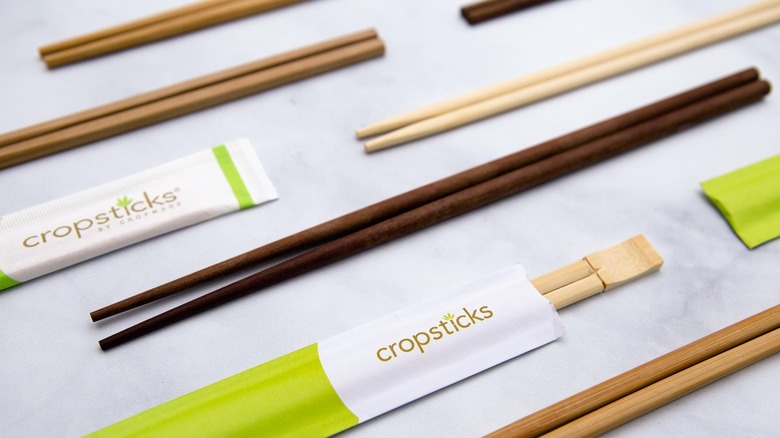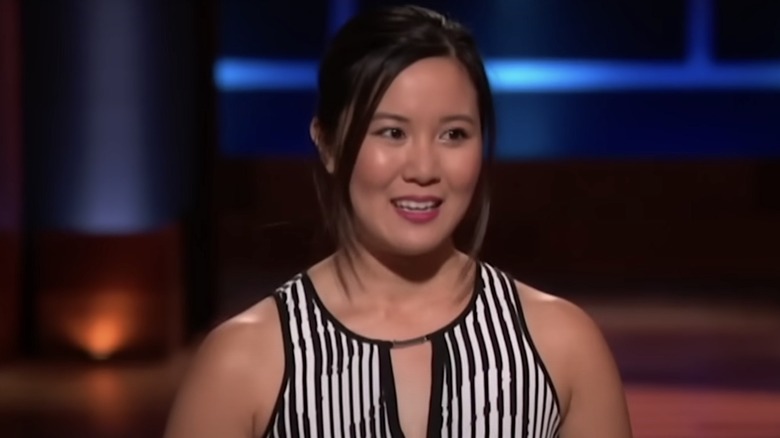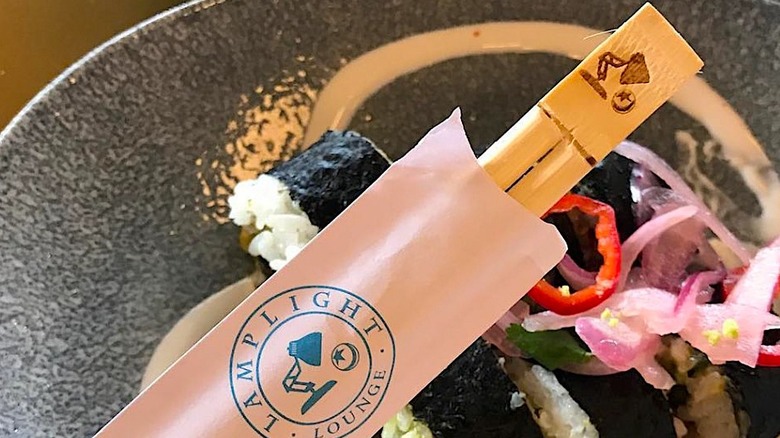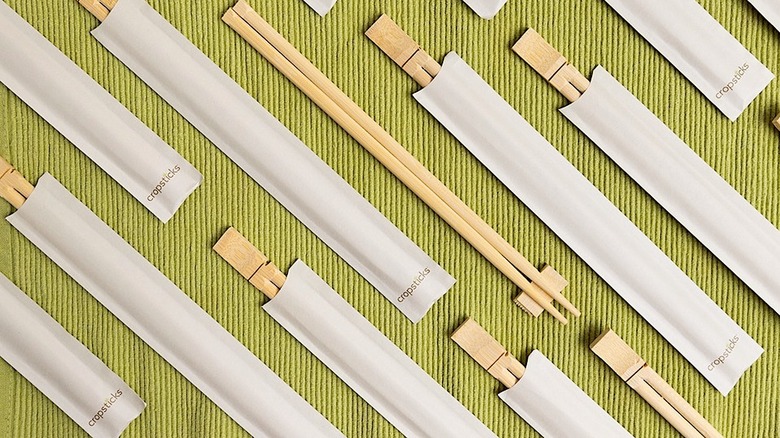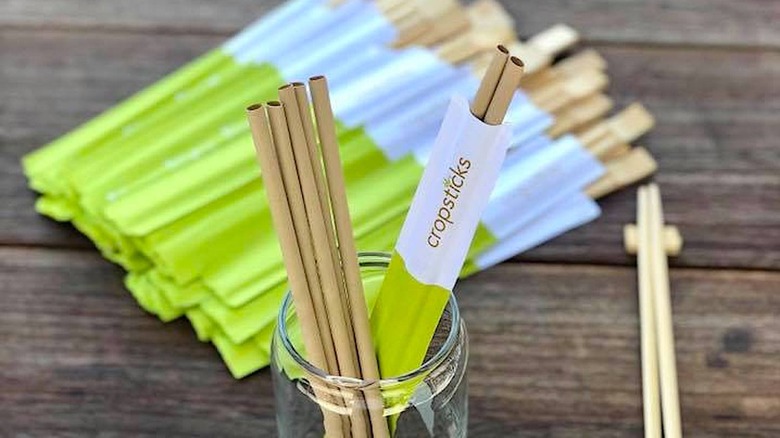Cropsticks: Here's What Happened After Shark Tank
Lots of budding entrepreneurs head to "Shark Tank" with a product they believe is an improvement on an item that already exists, or an easier way of doing things. For Mylen Fe Yamamoto, a lecturer in entrepreneurship from Hawaii, that item was chopsticks — a utensil that has been around for over 4,000 years but needed an upgrade.
Yamamoto was flying to Singapore in 2015 when she came up with the idea. As she was eating her in-flight meal, she noticed a problem with her regular chopsticks: They kept sliding off the table. Not only that, but wooden disposable chopsticks can cause splinters when broken apart, and around 45% of the standard single-use implements are made from trees, causing environmental damage. To top it off, not having a rest means laying the eating utensil on what could potentially be a dirty surface
Yamamoto's solution was to create a new model of chopsticks that featured a built-in rest, which could be snapped off to use, meaning there was no need for a separate hashi-oki, or rest. Yamamoto also made her design from sustainable bamboo for a more eco-friendly option. Having given up her full-time lecturing job in 2016 to focus on the emerging company, she headed to "Shark Tank" for Season 8 of the show, which aired in April 2017, seeking $75,000 for a 12.5% stake of her Cropsticks company.
What happened to Cropsticks on Shark Tank?
Describing Cropsticks as "chopsticks, reinvented" (via YouTube), entrepreneur Mylen Fe Yamamoto had already launched a Kickstarter campaign to help fund the early stages of her product by the time she appeared on "Shark Tank". The campaign had brought in over $21,000, and Yamamoto had started to receive conditional purchase orders from several businesses, including the Hyatt hotel chain, totaling $190,000.
The Sharks were impressed by the product itself, using the chopsticks to eat a selection of sushi placed before them. But they had some questions and concerns regarding Cropsticks' business to business (B2B) model, the market strategy, and the pricing. Yamamoto explained that many Asian restaurants operate in a kind of tier system, with places such as P.F. Chang's spending between three cents and eight cents per unit on their chopsticks versus the likes of Nobu, who may spend between eight and 17 cents. Furthermore, Cropsticks cost her just over two cents to make.
But the Sharks were worried that Cropsticks cost more than regular chopsticks to manufacture. Kevin O'Leary, the first to drop out, after citing that he had previously been involved in a deal involving bamboo cutlery, even compared Yamamoto to "Bambi in the forest." Shark Daymond John felt it was too early to invest, and Robert Herjavec agreed with O'Leary that the products needed to be the same price as their traditional alternative in order to appeal to distributors. Cropsticks eventually left the Tank without a deal.
Cropsticks after Shark Tank
Despite not securing a deal on "Shark Tank," Mylen Fe Yamamoto continued to grow her business. And it turned out that the vision was bigger than just the patented bamboo Cropsticks, which were just the first product from an emerging umbrella company. Called Cropmade, the aim was to create a line of innovative items for the food and beverage industry, with sustainability its core purpose.
In 2018, Cropsticks, along with manufacturing partner ChopValue, launched a pilot program in Los Angeles, expanding into upcycled homeware items made from used Cropsticks, such as tabletops, flooring, or shelving.
The company also expanded its line of products to include items such as bamboo chopsticks from FSC certified factories, and it hired an expert in sustainability to help drive and implement the company's mission. The result was that Crospticks was able to obtain Certified B Corporation status in 2019, in recognition of its social and environmental impact. And soon, big companies such as Disney Parks & Resorts, Roy's Restaurants, and Walgreens began to pay attention to the fledgling eco-friendly brand.
Is Cropsticks still in business?
Cropsticks is still very much in business, and can currently be found in over 500 restaurants, hotels, and other retailers, including brands such as Four Seasons and Hakkasan. The range of products offered by the company has also continued to grow. This includes classic chopsticks made from bamboo, as well as the Cropsticks with the built-in rest that the company took to "Shark Tank." Items can be custom engraved for specific businesses, adding a personalized touch; for example, Disney Resort Aulani in Hawaii uses bespoke Mickey Mouse branded Cropsticks.
The company also expanded its offering to include sustainable bamboo fiber straws, available in different sizes, as an alternative to plastic or paper straws. These include a large version suitable for drinks such as smoothies or boba tea in cafés. And there's also a smaller size, designed for bars and restaurants to use as cocktail straws.
Ever committed to the fast-growing, sustainable properties of bamboo, Cropmade even has a sustainable bamboo planter made using upcycled Cropsticks, which was originally designed as an office feature for the company. The idea being, if you also want to get on the bamboo bandwagon, you can grow the plant yourself at home.
What's next for Cropsticks?
Although Cropsticks' social media and website do not specify that there are any new products in the pipeline, the business continues to innovate and adapt; Cropsticks launched new designs for its wrappers in early 2024. And since the business refers to itself by the name Cropsticks by Cropmade, it means the door is always open for any future innovative items they may wish to add to the current collection.
Founder Mylen Fe Yamamoto is also keeping very busy outside of her Cropsticks business. She continues to be the CEO of a talent management and production company called Clique-Now, which she founded in 2012 in LA. In December 2022, Yamamoto revealed that the company had "curated over $10 million dollars worth of deals and opportunities" (via Instagram) over its 10 years in business.
The entrepreneur continues to spend time traveling to events and festivals as a speaker, as well as serving on the board of organizations such as the American Advertising Federation of Los Angeles. Whatever's next for Cropsticks, Yamamoto has certainly kept a high profile since "Shark Tank," which can only be beneficial for her future business plans.

